Being ahead of the curve is not simply a choice in a world where digital commerce is developing more quickly than ever; it is a requirement. In this blog post, we’ll take a tour of the dynamic world of headless ecommerce platforms. These platforms allow you to manage your online store without needing any front-end coding or design experience.
If you’re searching for a game-changing approach to your e-commerce strategy, look no further. Welcome to the future of online retail, where the term “headless” is about to become your new best friend.
Let’s dive in and explore the best headless ecommerce platforms that are transforming the way we buy and sell online.
What Is A Headless eCommerce Platform?
A headless commerce platform is a type of eCommerce platform that decouples the front end of an eCommerce platform from the back end. This means that the customer-facing part, where shoppers interact, is separate from the business logic that powers the entire experience.
This separation makes it possible to build different versions of the front end for different markets or languages without having to change the back end – which can be a huge challenge when it comes to maintaining compatibility and reliability. Headless platforms also make it much easier to update and improve the user interface without having to touch the back-end codebase.
There are several reasons why headless eCommerce platforms are popular:
- First, they can be deployed on existing web servers without requiring any modifications or upgrades – making them a low-risk proposition for businesses.
- Second, headless platforms have minimal dependencies on external services, which means that they’re more reliable and efficient than traditional eCommerce systems.
- Finally, headless platforms provide a better user experience because the front end is separate from the back end codebase – meaning that it can be crafted with greater flexibility and customized to meet specific needs.
What Are The Benefits Of Headless eCommerce Platforms?

There are a number of benefits that can be achieved by using headless eCommerce platforms. These include:
A Flexible Solution
Headless eCommerce platforms are a flexible solution for eCommerce teams that want to bring a unique approach to their store. They allow you to easily deliver highly customized experiences that render perfectly on any device, including desktop computers, laptops, tablets, and smartphones.
This makes them perfect for companies that want to create a unique brand presence or offer customers an expansive range of products and services.
Ease Of Use
Headless eCommerce platforms are extremely easy to use – even for first-time eCommerce entrepreneurs. All you need is a good understanding of HTML, CSS, and JavaScript, and you’re ready to go!
Simply design your template using the drag-and-drop editor, then add your products and pages. You can also set up shipping methods and payment gateways, as well as customize the look and feel of your storefront using themes or plugins.
Automated Process
Deploying a website on a hosted platform like AWS or Azure can be a huge time-saver for you.
This is because you no longer have to worry about the technical details of your website. Automated tools will take care of everything for you, from setting up your web hosting and security measures to optimizing your website for performance.
In addition, these platforms offer great customer support so that you can always be sure that your website is running smoothly.
Improved Customer Service
Since headless eCommerce platforms don’t require any human interaction, they provide improved customer service thanks to automation. This means that customers will be able to get in touch with a live agent more easily and solve their problems faster. In fact, oftentimes these platforms are designed in such a way that it’s impossible for customers to contact anyone else besides the support team.
This is an excellent way to improve your customer service overall because it eliminates the need for time-consuming phone calls and frustrating chats. It also allows you to focus on more important tasks, like resolving customer issues or providing support for your products.
What Are The Disadvantages Of Headless eCommerce Platforms?

There are a few disadvantages to using headless eCommerce platforms.
More Required Work
Headless eCommerce platforms are a new type of eCommerce platform that allows retailers to run their businesses without the need for any user interface or displays. This can be a huge advantage for some businesses, as it eliminates the need for more work from the retailer.
However, headless eCommerce platforms do require more work from the retailer than traditional eCommerce platforms. They must handle all of the shopping processes through code, which can be time-consuming and difficult to learn and use correctly.
Additionally, headless eCommerce platforms are not yet widespread enough to be considered mainstream, so you may have difficulty finding an appropriate one that meets your needs.
Scalability
Second, headless eCommerce platforms may struggle with scalability. Since they rely on coded instructions rather than graphical interfaces, they may not be able to handle high volumes of traffic or transactions quickly enough.
This is a serious issue because headless eCommerce platforms are becoming more popular as businesses move away from traditional website design and towards digital solutions that are faster and easier to use. If these platforms can’t manage the load quickly enough, it could impact both the user experience and the performance of the platform itself.
There are a few ways headless eCommerce platforms can try to tackle this problem. They could build custom code specifically for their platform, which would allow them to process large amounts of data more quickly.
Alternatively, they might opt for centralized servers that can help distribute the load across multiple devices in order to improve response time. Ultimately, though, there is only so much that heads-down technologies can do when faced with increased demand from users.
Security Risks
Headless eCommerce platforms are a great way to streamline your online shopping experience, but they also have some security risks that need to be taken into account. If the platform is not properly maintained, it can open up your store to cyberattacks. And if it’s not protected from such attacks, it could lead to serious data losses or even financial damages.
To make sure you’re taking all necessary precautions when using a headless eCommerce platform, make sure you have an operational strategy in place and keep tabs on the latest trends and threats related to this kind of technology. Also, use proper security measures (such as firewall protection) to protect your data against potential breaches.
Top 10 Best Headless eCommerce Platforms
1. Shopify
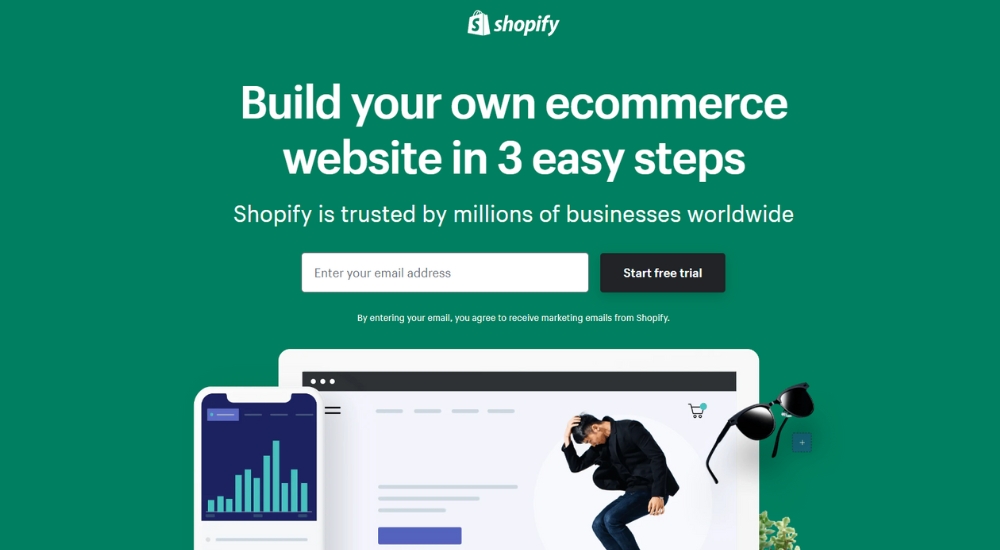
Shopify is a leading e-commerce platform that’s used by millions of businesses all over the world.
They released an API called GraphQL that makes it possible to build headless applications using Shopify Plus – which is perfect for modern, automated commerce. This means that you can run your business without having to directly interact with the website or store. This allows you to focus on running your business rather than managing the website and store itself.
You can easily create and publish your product listings, product pages, blog posts, and more on your website or blog using the same platform. You can also use this feature to create e-commerce stores that are accessible from any device or channel – including desktop computers, mobile devices, tablets, and even smart TVs!
This has been a game changer for Shopify, as it has made them one of the most relevant and trusted platforms for modern, automated commerce. They have already seen a surge in demand for their services, and their popularity is only going to continue increasing in the years to come.
2. Magento (Adobe Commerce)
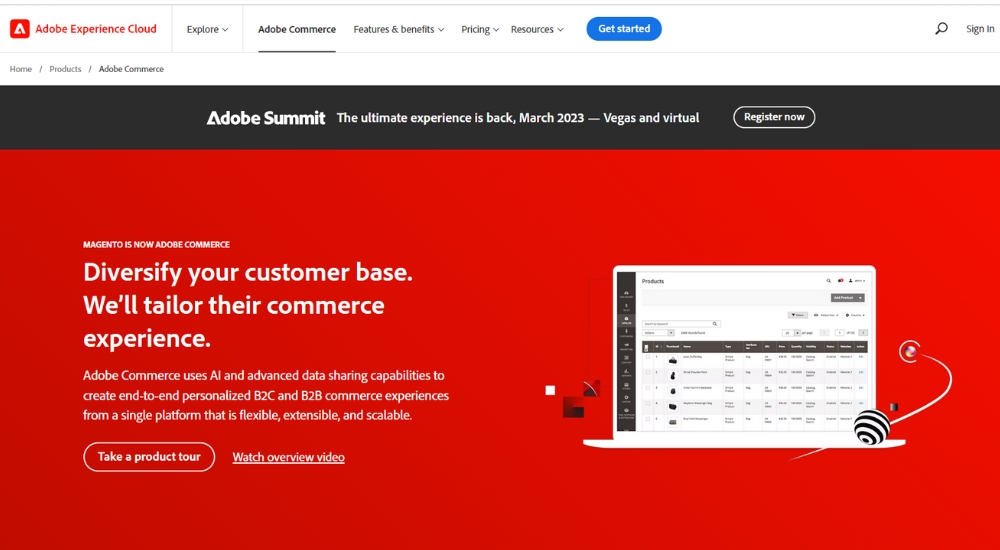
Magento is a highly customizable headless commerce platform that developers can use to create custom applications that fit the needs of their customers. It also includes several omnichannel solutions stores. This means that you can sell your products through different channels, such as online, in physical stores, or through mobile apps.
One of the most popular features of Magento is its scalability. It is able to handle large volumes of traffic and transactions without breaking down. Plus, it’s easy to customize so that it looks and feels like your own website. This makes it a popular choice for businesses that want to expand their reach online without having to invest in a separate website development project.
Overall, Magento is an excellent choice for businesses that want to build a strong online presence without spending a lot of money upfront. It’s also very user-friendly, so you shouldn’t have any difficulty adjusting it to meet your specific needs.
3. BigCommerce
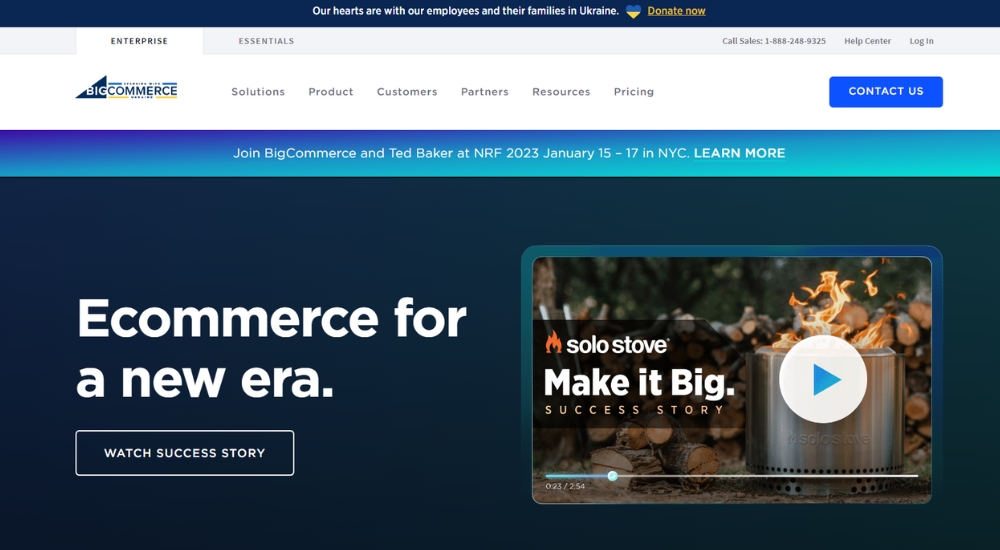
BigCommerce is a popular open-source e-commerce platform that offers headless commerce functionality. This means that you can run various stores simultaneously across many different channels, without having to configure or maintain separate user interfaces for each one.
BigCommerce is a popular commerce platform that allows you to create and manage your online store using an easy-to-use interface. It offers a wide range of features, including support for plugins and integrations with various API platforms. This means that you can easily create custom experiences for your customers based on the data they provide through their accounts on these platforms.
One of the most popular API integrations with BigCommerce is the eBay integration. This allows you to easily add items from eBay to your store, manage your auctions, and collect payments from buyers. You can also use Amazon integration to sell products directly from your store to Amazon customers. And, there are also integrations for Google, Stripe, and Adobe Experience Manager (AEM).
This is a great option if you want to experiment with different e-commerce platforms without having to worry about getting bogged down in the details. It also makes it easy to switch between different stores without affecting your customer data or the checkout process.
4. commercetools
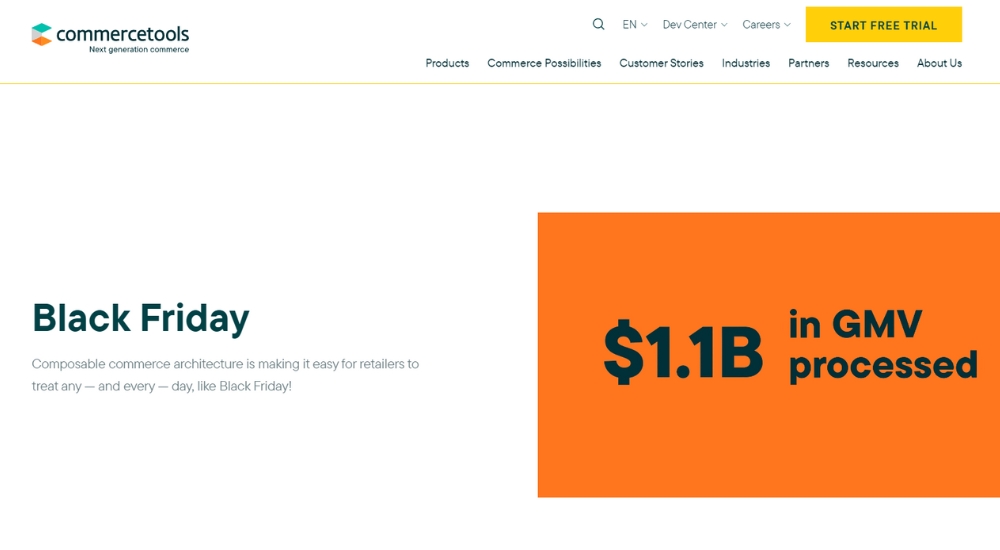
commercetools is a cloud-based point of sale (POS) solution that helps companies manage their sales and inventory in a more efficient way. It offers both B2B and B2C companies the option to use it as their primary point of sale solution, and it has become a popular option for both sectors.
One of the main reasons why commercetools is so popular is because it integrates with an omnichannel platform, which means that it can offer users a comprehensive range of features and functions. This includes the ability to manage orders through Amazon’s FBA service, as well as handle payments through its own payment gateway.
Additionally, commercetools offers users access to a wide range of tools and resources, such as market research reports and customer feedback surveys.
In short, commercetools is a powerful tool that can help businesses to streamline their sales processes and improve their overall efficiency. If you’re looking for an omnichannel platform that can offer you all the features you need to run your business efficiently, then commercetools should be at the top of your list!
5. Salesforce Commerce Cloud
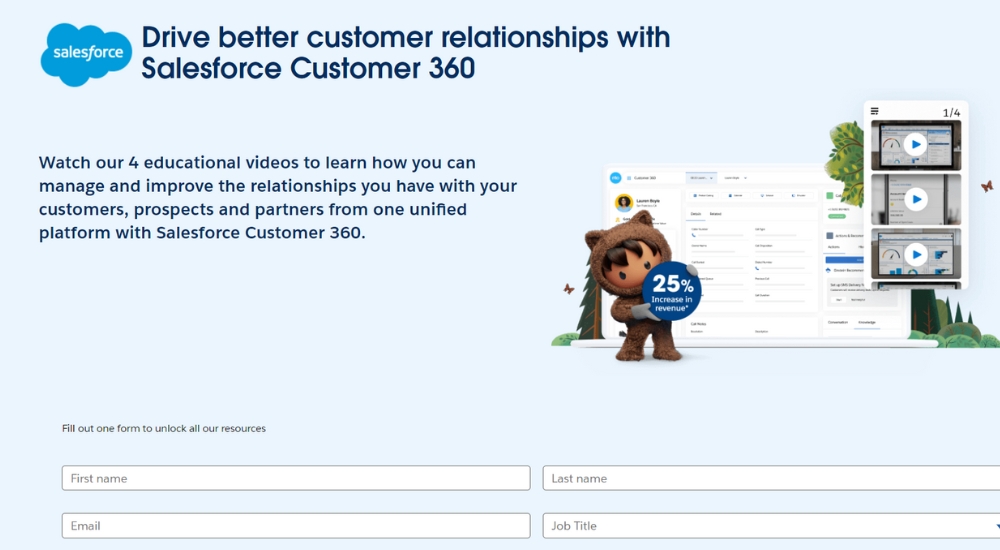
Salesforce Commerce Cloud is an agile platform that offers enhanced security and a partner app ecosystem. It connects your store with your CRM seamlessly, so you can keep track of all your customer data in one place. Plus, the partner app ecosystem includes apps like Shopify, Magento, and WordPress, so you can easily connect your store to the other parts of your business.
Overall, Salesforce Commerce Cloud is a great choice for businesses that need an agile platform that offers enhanced security and a partner app ecosystem. It makes it easy to connect your store with other parts of your business, so you can keep track of everything in one place.
6. Spryker
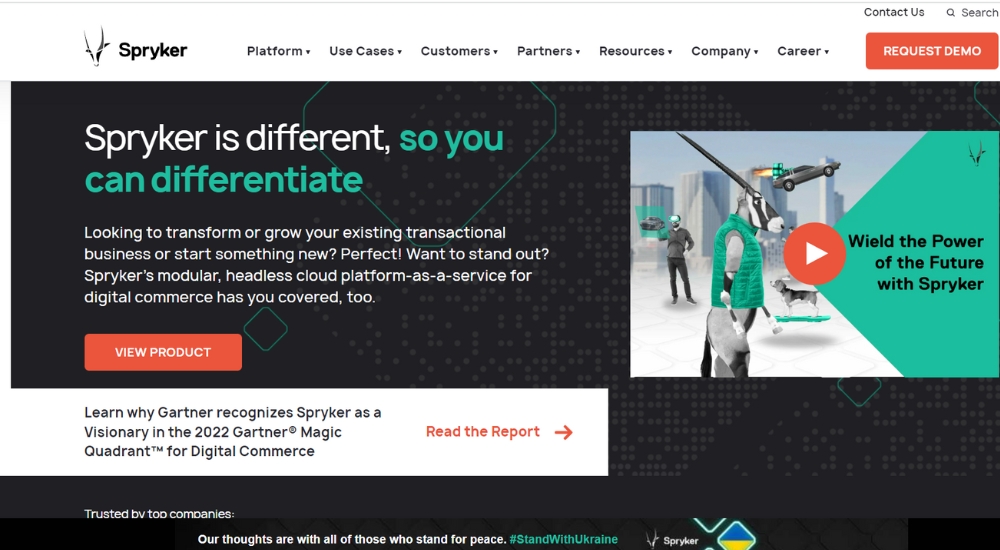
Spryker is a Germany-based headless commerce platform that offers solutions for B2B and B2C companies. It has more than 900 API modules, making it easy to integrate with your own systems. Additionally, its cloud-enabled service makes it easy to keep your data up-to-date and accessible from anywhere.
Its user interface is very simple, showing orders and offers on the homepage. Integrated into massive legacy platforms, Spryker can be customized through its various partner services to make it fit the needs of each individual business.
Some of the biggest brands in the world rely on Spryker to help them run their businesses smoothly. For example, Prym is Spryker’s largest customer and uses the platform to manage orders and inventory across sales channels. Lekkerland also uses Spryker to manage its eCommerce activities and offers customers an online shopping experience that’s second to none.
7. Infosys Equinox
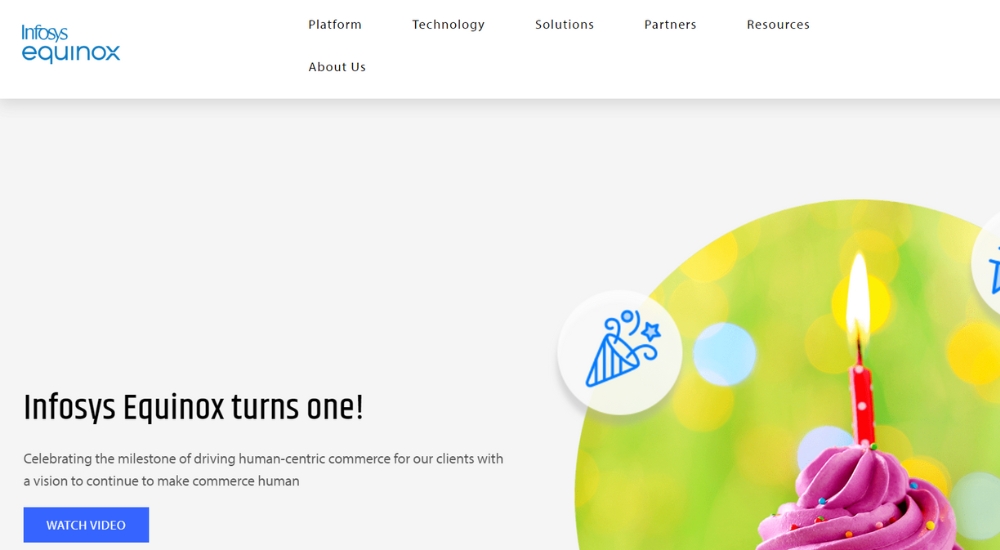
Equinox is a US-based headless commerce company that combines human-centric commerce with a personalized experience across various touchpoints and channels. It has 25 technology partners worldwide, including IBM, Microsoft, Oracle, Salesforce, Shopify, and Uber Eats.
It offers a variety of solutions for different business models, including B2B, B2C, D2C, and B2B2C. Pricing is available upon request, and the company offers demos through its website.
Equinox offers a unique business model that allows businesses to operate as both direct sellers and indirect buyers. This way, businesses can maximize their visibility and reach by selling through Infosys Equinox’s marketing platforms while also benefiting from the company’s eCommerce skillset. In addition to this, Infosys Equinox offers its customers 24/7 customer support via chat or phone.
Equinox is Infosys’ latest innovation that combines the power of messaging services, voice platforms, social media sites, chatbots, VR and AR, IoT devices, and wearable technologies to create a single platform for customers to manage their interactions with Infosys.
The idea behind Equinox is that it will make it easier for customers to get help from Infosys whenever they need it. They can use the platform to send and receive messages, access information about their cases through social media and chatbots, view case files in VR or AR, and consult with experts via voice calls or chats.
8. Swell

Swell is a US-based headless commerce platform that specializes in customer experiences and unique business models. It is easy to use and can be integrated into any website or eCommerce platform.
One of the company’s main goals is to make it easier for businesses to connect with their customers. It does this through its headless commerce solution, which allows businesses to operate without the need for a human operator. This makes Swell one of the most advanced and versatile headless commerce platforms on the market today.
In addition, Swell offers a variety of unique business models that make it possible for businesses of all sizes to take advantage of its capabilities. For example, it offers a subscription service that allows users to manage their orders from anywhere in the world. Additionally, it has developed a number of other features that make it an ideal platform for businesses of all types.
9. OroCommerce
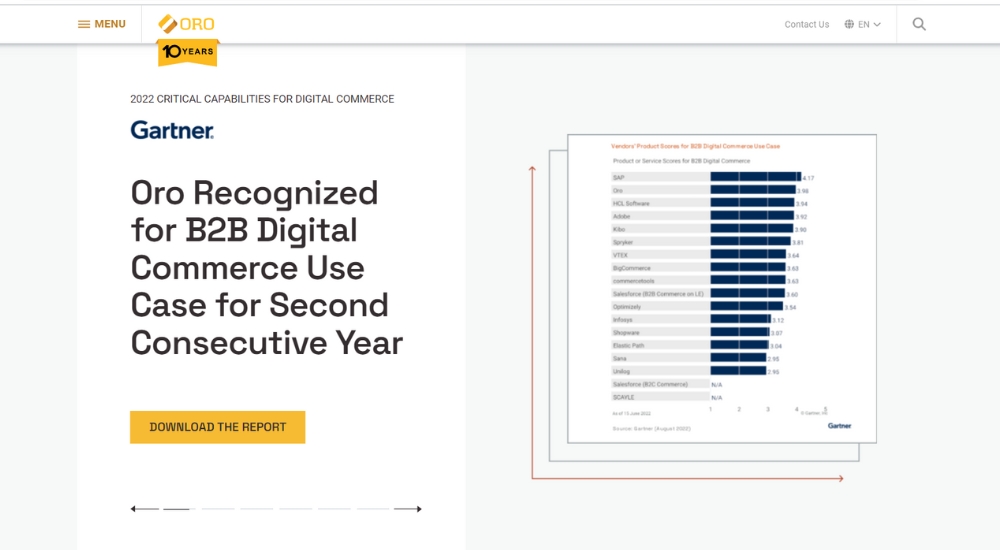
OroCommerce is a headless commerce platform that’s popular with wholesalers. It’s specifically designed for the B2B industry, and it integrates with many CRM apps and ERP solutions. It also integrates with systems like Shopify and Magento, making it easy for businesses to get up and running.
One of OroCommerce’s most unique features is its built-in CRM system. This allows businesses to manage all their customer data in one place, which makes it easier to track customer interactions and conversions. Plus, it has a very user-friendly interface that’s easy to navigate.
Overall, OroCommerce is a great choice for businesses who need a headless commerce platform that is chaotic-free and easy to use.
10. Nacelle
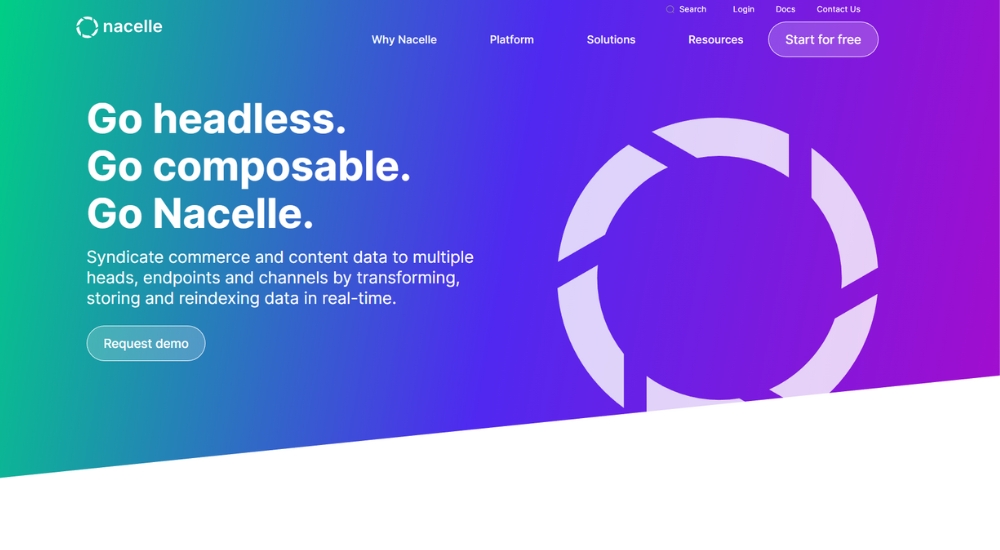
Nacelle is a headless commerce platform that makes it easy to create a headless architecture with the tech stack you’re already using. It also extends to other CMS, PIM, and OMS systems as well.
Nacelle can also gather data from custom-built platforms, which makes it an ideal solution for collecting customer data from third-party applications. Additionally, Nacelle’s flexibility means that it can be adapted to different business needs and requirements. It is a fantastic tool for data delivery.
It offers pre-built integrations with Sanity and Contentful, as well as the option to customize it to fit in with an existing tech stack. Nacelle makes it easy to get your data into the right format and into the hands of the people who need it most.
FAQ
1. What is a headless eCommerce platform?
A headless eCommerce platform is an architecture that separates the front-end from the back-end of your eCommerce store.
Instead of relying on a traditional page-oriented, monolithic web server with heavy traffic being handled by large servers, headless eCommerce platforms use lightweight servers and API based services to handle customer requests and manage communication between the customer and business.
The goals of using a headless commerce solution are twofold:
- It allows for faster loading times as many requests don’t require complete website reloads due to its lightweight architecture;
- It provides scalability through microservices which helps manage high amounts of traffic without costly infrastructure investment or performance hiccups.
2. What is an example of headless commerce?
An example of headless commerce is when a business conducts its transactions without the need for a customer interface – often referred to as “web 2.0.” This refers to companies that allow customers to conduct transactions through an online portal, without needing to visit the company’s physical location.
This type of business is becoming increasingly popular because it allows businesses to save money on costs associated with employee wages and marketing expenses. It also opens up new opportunities for businesses to target customers who are not currently located near their storefront.
3. Is Headless CMS good for eCommerce?
Yes, Headless CMS is a great option for eCommerce sites. It has a variety of features that can help you manage your site more efficiently, including:
- A built-in shopping cart that makes it easy to store and manage your customers’ orders.
- The ability to create custom pages and posts for your site, so that you can easily create and manage your content.
- A drag-and-drop interface that makes it easy to create custom designs for your site.
- Support for affiliate marketing and other forms of advertising, so that you can generate revenue from your website.
- An automatic backup system that ensures your data is always safe and secure.
All in all, Headless CMS is a great option for eCommerce sites that want to improve their efficiency and productivity. If you’re interested in learning more about this platform, or in trying it out for yourself, be sure to contact us today!
Wrap Up
In conclusion, the eCommerce market is booming. People have a lot of choices when it comes to platforms they can use for their business. But, if you want to be ahead of the game, you must choose a headless platform that can help your website grow and gain more traffic without any hassle.
Just like we have mentioned above, some of these platforms offer advanced features like live chat support and in-depth analytics that help people make better decisions faster. Before choosing an eCommerce platform though, ensure that it has all the necessary setup options available so that you don’t face any issues while running your store through its first few days of operation!

